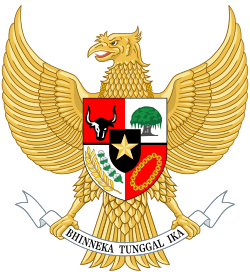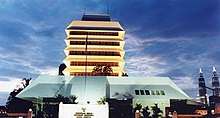Embassy of Indonesia, Kuala Lumpur
The Embassy of the Republic of Indonesia in Kuala Lumpur (Indonesian: Kedutaan Besar Republik Indonesia di Kuala Lumpur) is the diplomatic mission of Indonesia in Malaysia. The embassy serves large amounts of Indonesian migrant workers in Malaysia. Other Indonesian diplomatic establishments in Malaysia include four consulate-generals in Johor Bahru, Kota Kinabalu (Sabah), Kuching (Serawak), and Penang, and a consulate in Tawau.[1]
| Embassy of Indonesia, Kuala Lumpur Kedutaan Besar Republik Indonesia di Kuala Lumpur  | |
|---|---|
 | |
| Location | |
| Address | 233, Jalan Tun Razak, 50400 Kuala Lumpur, Malaysia |
| Coordinates | 3°8′48″N 101°43′19″E |
| Ambassador | Rusdi Kirana (id) |
| Website | web kemlu |
History
Before Malaysia became an independent state, Indonesia had already established a diplomatic mission in the form of a consulate in 1953. The head of the mission was Consul Mohammad Rasyid Manan (1953–1956). He became consul general when the mission became a consulate general as Malaysia neared its independence (1956–1957). After the establishment of Malaysia as a sovereign state, the Indonesian diplomatic mission became an embassy with Muhamad Razif (1957–1963) as the first Indonesian Ambassador to Malaysia.[2]
Diplomatic relations ceased on 17 September 1963 due to the Indonesia–Malaysia confrontation. The process of normalization of relations started with the signing of the Bangkok Accord between the foreign ministers of both countries on 1 June 1966 in Bangkok. The next meeting took place in Jakarta, which produced the Jakarta Accord on 11 August 1966. A further meeting took place in Kuala Lumpur on 14 September 1966. As a consequence, on September 1967 the Indonesian government established a liaison office in Kuala Lumpur that was headed by Benny Moerdani. Initially, the embassy was located in U-Thant Road, but it was relocated to an 8-story building at Tun Razak road, its present location, in 1977.[3]
The embassy has been a site for demonstrations, including ones related to haze and arrests of Malaysian fishermen.[4][5]
Services
Aside from routine services, the embassy also has dedicated shelters for Indonesian migrant workers in Malaysia who encountered difficulties.[6] It also works with the Malaysian government to register otherwise illegal migrant workers.[7] In 2017, under ambassador Rusdi Kirana, the embassy began offering 24-hour services.[8]
References
- "Konsulat Jenderal dan Konsulat Republik Indonesia Di Malaysia". kemlu.go.id (in Indonesian). Retrieved 6 September 2018.
- "Sejarah KBRI Kuala Lumpur" [History of KBRI Kuala Lumpur] (in Indonesian). Embassy of the Republic of Indonesia in Kuala Lumpur, Malaysia. Archived from the original on 2006-07-02. Retrieved 2019-10-26.
- "Kedutaan Besar RI di Kuala Lumpur". kbrikualalumpur.org (in Indonesian). 24 February 2017. Retrieved 6 September 2018.
- "Protes Kabut Asap, Warga Malaysia Demo di Depan KBRI". VIVA (in Indonesian). 19 September 2015. Retrieved 6 September 2018.
- "Protes Penangkapan Rekannya, Nelayan Malaysia Demo KBRI". Republika (in Indonesian). 17 October 2012. Retrieved 6 September 2018.
- "Mengintip Shelter TKI di KBRI Kuala Lumpur". VIVA (in Indonesian). 2 April 2018. Retrieved 6 September 2018.
- "Kedutaan Indonesia sedia bantu Malaysia daftar pekerja tidak sah". Utusan Online (in Indonesian). 22 February 2016. Retrieved 6 September 2018.
- "KBRI Kuala Lumpur Buka 24 Jam". ANTARA News Kuala Lumpur (in Indonesian). 29 September 2017. Retrieved 6 September 2018.